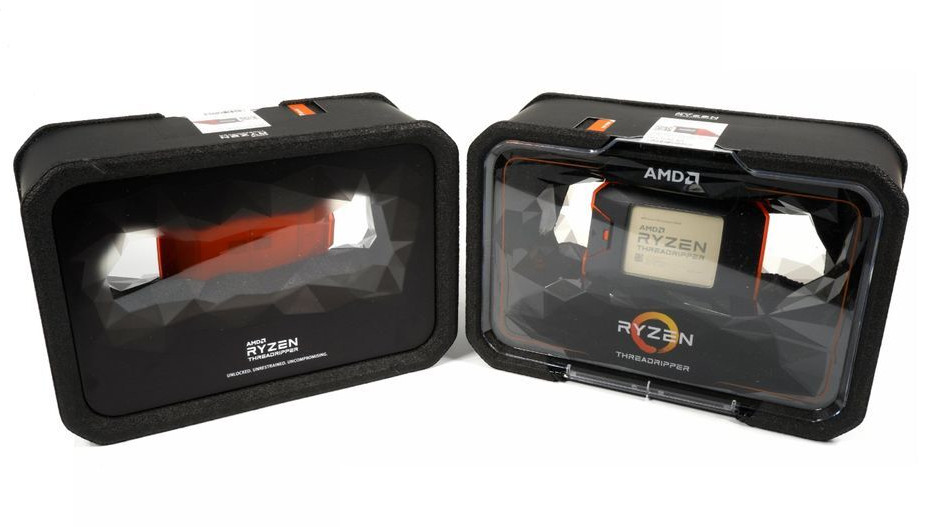New EU packaging regulations spark misplaced fear of CPUs ditching stock coolers
It seems more targeted at excess packaging in general, though.

Two days ago, on the PCMR subreddit, Reddit user redmera highlighted an upcoming change in EU regulations that would ban "ridiculous CPU packaging" like what used to be found on Intel's Core i9 and AMD's Ryzen Threadripper CPUs, among others. Subsequently, NikTekOfficial on Twitter declared, based on this Reddit post, that CPU manufacturers would be forced to ditch stock CPU coolers, which has spurred subsequent coverage to repeat this as fact.
However, based on a close analysis of the source and referenced material, the imminent death of stock CPU coolers seems exaggerated due to a misunderstanding of the regulations. Phrasing in the original PPWR directive notes that:
"An item which is an integral part of the product and is necessary to contain, support, or preserve that product throughout its lifetime and where all elements of that item are intended to be used, consumed or disposed of together should not be considered to be packaging given its functionality is intrinsically linked to it being part of the product."
Because CPU coolers are integral to functionality, outright eradicating stock CPU coolers was never mandated and likely isn't on the table. Some exceptions exist, such as Intel's K-series chips and OEM tray CPUs, which don't come with stock coolers. Most enthusiasts have incentive to shop for aftermarket CPU coolers, particularly with unlocked CPUs.

When Intel retired its old dodecahedron-shaped Intel Core i9 packaging, it did so because the shipping costs for those CPUs had become incredibly prohibitive. This is both because the packaging was inefficient, creating lots of shipping waste, and bulk-shipping processors is already fairly expensive before they're a limited selection of highly-binned chips. AMD also had to make a similar decision with its old Ryzen Threadripper box designs, which left an excess of empty space for presenting the HEDT CPUs with more grandiose flair. Neither Core i9 or Ryzen Threadripper CPUs have ever included stock CPU coolers, but the pivot from boxing presentation to functionality for sake of shipping and organization has been noted across CPU providers for about the past five years. Most, if not all of the work mandated by the EU here is already done, in other words.
But would it be better for the market and environment if CPU makers stopped bundling stock coolers across the board? Probably not. Mandatory separate cooler purchases certainly wouldn't be good for the environment regarding shipping and packaging costs, whether or not stock coolers remain available in that form.
As fun as it is to bag on the anemic stock cooler designs of yesteryear, AMD and Intel's recent stock coolers boast significantly improved designs that are well within the specifications of their intended CPUs. The low-profile designs are also usually perfectly fine for use within SFF PC builds. They are generally much more strict regarding what cooling they can allow— though perhaps not as efficient as cutting-edge aftermarket SFF air coolers.
Get Tom's Hardware's best news and in-depth reviews, straight to your inbox.

Christopher Harper has been a successful freelance tech writer specializing in PC hardware and gaming since 2015, and ghostwrote for various B2B clients in High School before that. Outside of work, Christopher is best known to friends and rivals as an active competitive player in various eSports (particularly fighting games and arena shooters) and a purveyor of music ranging from Jimi Hendrix to Killer Mike to the Sonic Adventure 2 soundtrack.
-
Blastomonas Typical scaremongering from people that like to tarnish the EU. Some people will read the part that suits their already solidified opinions. Confirmation bias.Reply
Rather than thinking that this is a sensible way of reducing waste and environmental impact.. -
Cpdons Reply
Did you read the article? I didn't think so.Kentmos said:And there goes EU again.. Dictating how things shall be and how people shall live..
The packaging regs only effectively cover excess packaging. This excludes bundled coolers and air pockets designed for impact protection.
This isn't the EU "dictating" what poor, embattled manufacturers can and can't do with their products, but instead making some effort to prevent gigantic plastic boxes (like threadrippers) that are almost entirely full of air, and serve no purpose other than to have a higher carbon cost and send more materials to landfill.
Rest assured, you can put your libertarian cap back on the shelf and try to think rationally. This is not an affront to your personal freedoms, and I'm sure manufacturers will get over the heartache. -
Konomi Reply
There's no real negative. Unless you're the kind of person that puts an empty box on display for whatever reason. All that'd maybe happen is packaging may just become kind of bland with minimal designs - which at the end of the day, is not even a deal-breaker. Generally you want what is inside the packaging, not the packaging itself. But if you want a fridge box filled with packing foam and the like for an SSD for example, you do you.Kentmos said:And there goes EU again.. Dictating how things shall be and how people shall live.. -
bit_user Reply
The problem is worse than packages that are oversized merely for aesthetic reasons. One anti-competitive tactic dominant brands sometimes employ is to make their packaging so large that it literally crowds out their competition. Retailers only have a certain amount of shelf space, so if the box for a must-have item takes up too much space, the retailer might decide not to stock some competing products. CPUs aren't the best example here, but even in that case, it could result in some retailers dropping some lower-demand models of the competing brand.Cpdons said:The packaging regs only effectively cover excess packaging. This excludes bundled coolers and air pockets designed for impact protection.
This isn't the EU "dictating" what poor, embattled manufacturers can and can't do with their products, but instead making some effort to prevent gigantic plastic boxes (like threadrippers) that are almost entirely full of air, and serve no purpose other than to have a higher carbon cost and send more materials to landfill.
So, the practice of excessive packaging can also harm consumers by way of artificially restricting choice. -
SirStephenH The regulation clearly doesn't ban bundling stock coolers, I don't understand how someone could "misread" it unless the "misreading" is intentional.Reply
I personally see stock coolers as unnecessary waste. Stock coolers are barely adequate. How many people actually use a stock cooler now and days when you can get a far better cooler for $20-$30? Every build I've seen for years utilizes an aftermarket cooler.
The author made a point that the extra packaging and shipping would be worse for the environment but there's a lot of overlap between the separate packaging and shipping of an aftermarket cooler and the extra packaging and shipping required to bundle a stock cooler. Then you add in the fact that the stock cooler most often never gets used and is simply tossed in the trash, so they're basically adding more waste in packaging and shipping in order to send trash to consumers, trash that has its own environmental impact to produce. I believe the environmental impact of unbundling coolers is net positive or negligible. Plus it's good for consumers to not have to pay for something they'll never use. -
newtechldtech IMO all CPUs should be sold in tray mode but with a sealed holographic sticker on the plastic with s/n and CPU model. all the box is not needed at all.Reply -
bit_user Reply
You do need just enough packaging that if one falls off a shelf onto a hard tile-on-concrete floor, it won't get damaged. However, it doesn't take a whole lot of packaging to achieve that level of protection.newtechldtech said:IMO all CPUs should be sold in tray mode but with a sealed holographic sticker on the plastic with s/n and CPU model. all the box is not needed at all.
I also like when the IHS is visible through a window, so that you can clearly see the model number and can tell whether or not it was previously used (i.e. due to the presence or absence of marks on the IHS that usually occur when attaching a heatsink). Another bonus is that you can tell when it was made, in case there's a particular revision you're looking for.
BTW, a word of caution against buying OEM "tray" CPUs: the warranty is only through the seller. If you want a manufacturer warranty, buy the retail-boxed version (depending on where you live, you might also need to buy it through an authorized reseller). -
Konomi Reply
For the most part, the majority of us also prefer it to be this way. However, there's always one (or a few) that turn a perfectly fine discussion political for whatever reason. Whether or not you believe in the whole climate change issue or not in this instance for the purposes of this discussion is meaningless - it is a pretty harmless situation and not one where people's lives are being heavily impacted in a negative way. But if people would actually just read before posting..Sluggotg said:I hate political debates on Tomshardware.com. I want to comment/debate on computer tech. I prefer to debate politics on political sites. The article is the kind that will always end up in a political debate. Then again I am reading and posting about the article.